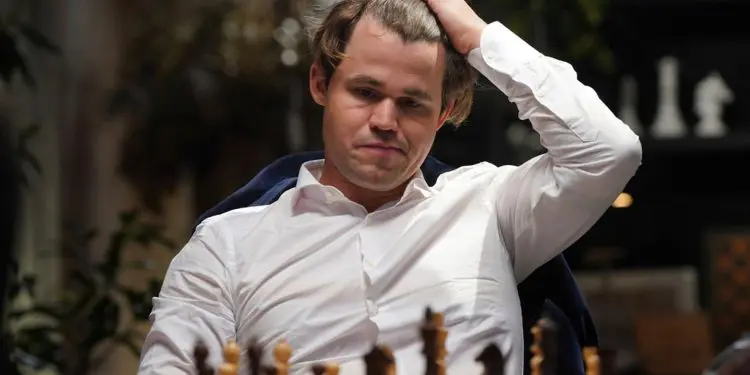In an unprecedented showdown off the board, Magnus Carlsen, the reigning chess grandmaster and five-time World Champion, stunned the chess world by walking away from the World Rapid and Blitz Chess Championships—over a pair of jeans.
The controversy erupted when Carlsen, often referred to as the “Mozart of Chess,” arrived wearing jeans, which violated the International Chess Federation’s (FIDE) strict dress code. FIDE, aiming to preserve the sport’s “professional image,” slapped the Norwegian prodigy with a $200 fine and demanded he change his attire. But Carlsen, never one to shy away from a battle—even off the chessboard—refused. In a dramatic twist, he withdrew from the tournament, sending shockwaves through the chess community.
“I play chess to challenge my opponents, not to model clothes,” Carlsen reportedly told officials before his exit, a move that has since been described as one of the boldest protests in modern chess history.
The Dress Code Debacle
FIDE’s dress code mandates “professional and elegant” attire, explicitly barring jeans. The rule, designed to uphold chess’s traditional image, clashed with Carlsen’s insistence on comfort and practicality. His withdrawal not only disrupted the championship but also ignited fierce debates about whether such regulations are out of step with the modern era.
Critics accused FIDE of being tone-deaf, with fans and commentators taking to social media to support Carlsen. “It’s absurd to penalize the world’s greatest chess mind over a pair of jeans,” one fan tweeted. “Let him play!”
A Game-Changing Resolution
The uproar forced FIDE to reexamine its rules. In a swift about-face, the federation relaxed its dress code, allowing “elegant minor deviations,” including appropriate jeans. With the rule change, Carlsen triumphantly returned to the competition, resuming play under the newly updated guidelines.
The Debate Over Tradition vs. Modernity
Carlsen’s bold stance has sparked a larger conversation about the balance between tradition and modernity in professional chess. Many see his actions as a catalyst for change, challenging outdated norms and proving that even the most intellectual of sports must adapt to the times.
“Magnus didn’t just stand up for himself—he stood up for every player who’s been stifled by unnecessary restrictions,” said one prominent chess analyst. “This could mark the beginning of a more inclusive and forward-thinking era for the sport.”
Carlsen’s Legacy Grows
Known for his fierce competitiveness and unorthodox style, Carlsen has never been afraid to break the mold. This latest chapter in his storied career only adds to his legend as a player who challenges not just opponents, but the very structures of the game itself.
With the drama behind him and his focus back on the board, Carlsen remains a favorite to dominate the championship. But his off-board triumph has already solidified his status as more than just a grandmaster—he’s a game-changer.






